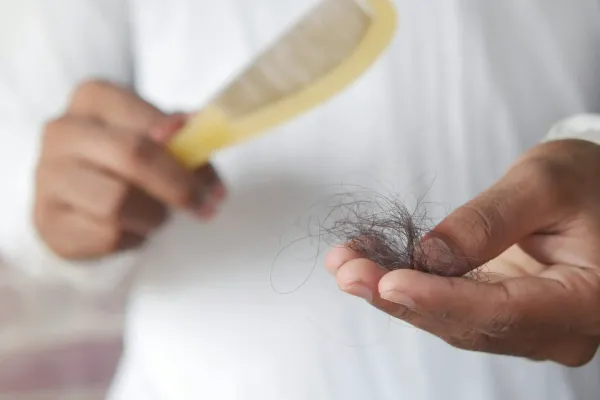Stress And Other Surprising Factors That Can Cause Hair Loss
admin | October 13, 2025 11:22 PM CST

is one of the battles most of us face, be it more than usual number of hairs in your hair brush or a widening part. But before the panic sets in, you should know that losing around 50-100 hairs a day is completely normal.
Also, many common types of are reversible if you can find the cause and treat it. Now, understanding these causes can not only help you treat hair loss but maybe even prevent it. Read on as we list some of the most common (and surprising) factors behind hair loss and how to manage them.
These factors might be responsible for your hair loss
1. Stress
Intense psychological stress and physiological shocks are well-established triggers for hair loss. Hair fall in these cases shows up 2-3 months after the trigger and often improves in 3-6 months once the trigger resolves. links stress-mediated changes in neurotrophic factors and inflammatory signals to hair-cycle disruption.
2. Sudden illness or infection
Major infections like Covid-19 have been repeatedly associated with acute hair fall. worldwide noted a spike in diffuse hair shedding 2-3 months after symptomatic infection. If you recovered from a feverish illness recently, your hair fall may be temporary.
3. Nutrient deficiencies
Low levels of iron, vitamin D deficiency and other micronutrient insufficiencies are frequently investigated in people with hair loss. The literature is mixed but several find higher odds of recent hair shedding when iron levels are very low. Treating confirmed deficiencies can help recovery. The role of vitamins and minerals is supported across reviews of nutrition and hair.
4. Thyroid and hormonal changes
Both hypothyroidism and hyperthyroidism can cause diffuse . Women may also notice changes with pregnancy, postpartum, or when stopping/starting hormonal contraceptives. If hair loss coincides with changes in menstrual cycles, weight, energy, or skin, check thyroid hormones and reproductive hormones.
5. Medications
Many commonly used drugs can cause hair shedding from chemotherapy to anticonvulsants, anticoagulants, retinoids, some antidepressants and more. The hair loss pattern varies by drug and mechanism: some cause hair fall, others may exacerbate androgen-driven thinning. If hair fall coincided with starting a medication, discuss alternatives with the prescriber (don't stop on your own).
6. Rapid weight loss / crash diets / eating disorders
Sudden caloric restriction and extreme diets can trigger hair fall. Beyond calories, low protein and insufficient micronutrients (iron, zinc, biotin not usually the only answer) can compound problems. A balanced plan, supervised if needed, usually helps hair recover over months.
7. Autoimmune disease
Autoimmune diseases like alopecia areata causes sudden, patchy hair loss and may be associated with other autoimmune conditions (thyroid disease, vitiligo). It needs early dermatology input because treatments differ.
8. Genetics
Genetics and age drive male and female-pattern hair loss. Treatments such as topical minoxidil or oral agents (under medical supervision) can slow progression and sometimes regrow hair; early treatment gives better results.
9. Scalp conditions and infections
Fungal infections, severe seborrheic dermatitis, or scarring conditions can cause hair loss. Scalp exam by a clinician helps distinguish these from diffuse shedding.
10. Hair care practices
Traction from tight hairstyles, harsh chemical straightening/bleaching, repeated heat - these can cause localised or diffuse damage. Avoid sustained tight styles, excessive chemical treatments and aggressive brushing; gentle care helps hair that's otherwise healthy.
Hair loss can be worrying, but research shows most common types are diagnosable and often treatable especially when you identify triggers such as stress, illness, nutrient deficiencies, medications or hormonal imbalances. If shedding is sudden, patchy, progressive, or causing distress, see a dermatologist and get targeted tests rather than relying on internet remedies. Timely, evidence-based steps give the best chance of recovery.
READ NEXT
-
Mohammedan Sporting: Will historic club be forced to shut shop?

-
Grease will wipe clean from ovens with 3 drops of natural ingredient

-
Travel: Top 10 Destinations Indians Are Eyeing For 2026 — Hidden Assam Gems To Thai Escapes

-
Health Tips - Sleeping too much can be detrimental to your health. Learn about the diseases you may suffer from.

-
Sports News - These Indian batsmen have scored centuries in the most balls in Test cricket. Learn about them.
